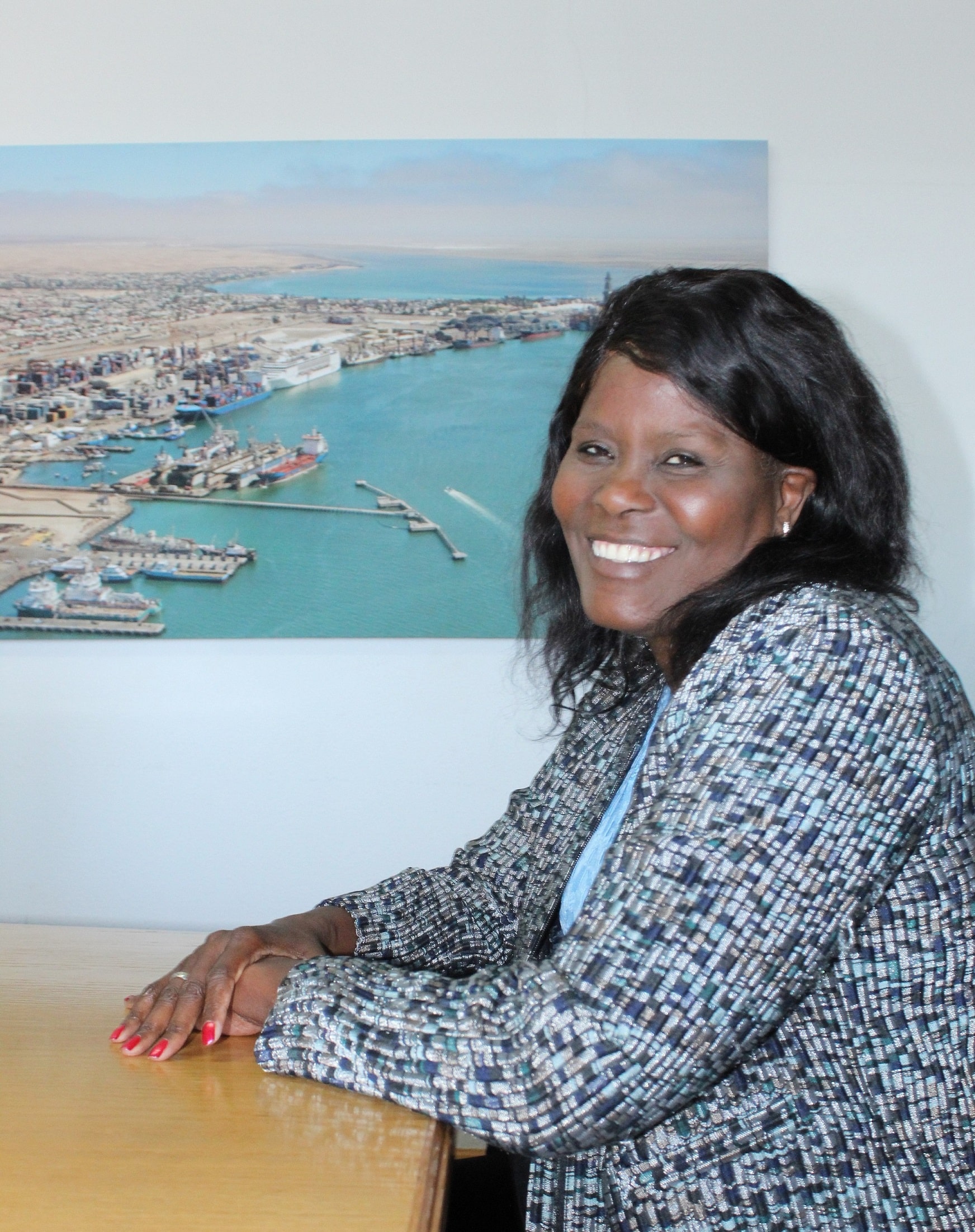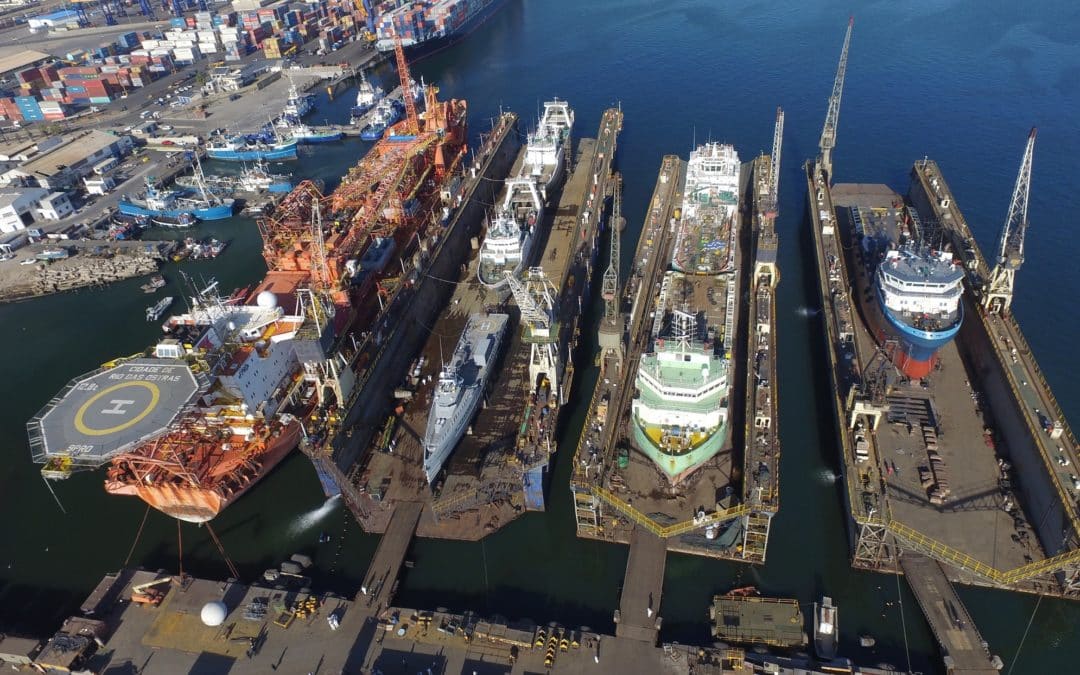“Namdock has resumed full operations with effect from Tuesday 5 May 2020, in accordance with the inception of stage 2 of the lockdown, which has seen the partial easing of restrictive measures thanks to the recent flattening of the infection curve,” explains Heritha Nankole Muyoba, Acting Chief Executive Officer of Namdock. “Namdock’s repair and maintenance yard activities are therefore fully operational.”

Heritha Nankole Muyoba, Acting CEO of Namdock
She told DryDock; “All facilities and staff members are adhering to the prescribed COVID-19 safety and sanitisation regulations, including working in shifts and observing strict social distancing, regular temperature readings, handwashing, and wearing of face masks, gloves and other prescribed personal protective equipment (PPE).
“The company has undertaken extensive research into recommended Covid-19 mitigation measures, and is thereby taking every precaution to ensure the safety of our valued clients, employees, and service providers – as well as our local Walvis Bay community – during this pandemic. As such, we are following all recommendations and protocols as directed by the Namibian Government as well as the Namibian Port Authority (Namport). We have to this end also implemented a comprehensive Covid-19 response plan, in accordance with recommendations by the Namibian Ministry of Health and Social Services and the World Health Organisation.”
In addition, the company also adopted a proactive approach to ongoing risk management, and has subsequently continually monitored adherence to the preventative measures put in place, in accordance with global best practice.
Working at capacity
We are working at full / 100 percent capacity,” Muyoba told DryDock. “In fact, we docked two vessels on the first day we were fully operational (5 May 2020). Notwithstanding operating at full capacity, in line with Namport’s directive, foreign-flagged vessels will still be required to stay at anchorage for a minimum period of two weeks before entering the main port, or docking for repairs. In some instances, the two week waiting period may be reduced, taking into account the vessel’s time spent at sea after leaving the last port of call.
Cancellations
“We are seeing some cancellations, due to the offshore sector being under pressure, which is attributable mainly to the currently low oil price,” she explains. “This has been negatively impacted by the drastic reduction in global demand for oil and fuel – caused by, amongst other Covid-19-related factors, the ban on international air travel. Oil majors are therefore playing a ‘waiting game’, and are also stacking their vessels offshore.
However, with our Panamax-sized dock, we are fortunately also well-positioned to offer general classification work, and to service bulk container, cargo and fishing vessels. In addition, with our extensive general engineering, welding and fabrication facilities and expertise, we are equally well-positioned to service coastal mining and other sectors.
Worked turned down
“Due to the national lockdown level, which was in place from 28 March to 5 May, Namdock did have to turn away some work, in order to observe the legislated measures put in place by the Namibian government,” Muyoba told DryDock. “However, we are pleased to report that some of our loyal and long-standing clients actually remained offshore in Namibian waters, until the 5 May, when the lockdown restrictions eased, and they were able to dock for repairs with us.
“Fortunately, we had an excellent 2019, and prior to that, we restructured the company in a lean and efficient manner. We are therefore strategically and operationally very buoyantly positioned to take advantage of the industry upswing, post-Covid, when it happens. We are of course aware that the oil price in particular could take a while to recover; however, we also know from previous experience how demand could quickly escalate when this happens, and we are well-prepared for this eventuality from a skills, facilities and capacities perspective.
“We are looking to fill any cancellations from oil and gas clients, with bookings from the bulk container, cargo and fishing sectors. This would be along the lines of general classification work; as well as the installation of ballast water treatment systems.
Bearing in mind the fact that, with air travel restrictions because of Covid-19, many countries can only import over-water, we definitely foresee a high demand in the cargo vessel sector. That being said, cargo vessels also go where the cargo is, so we are approaching that sector of the market strategically and judiciously.”
Supplier support
“Our local Walvis Bay and other Namibian suppliers have really gone the extra mile, being ready and willing to open up and work alongside on the dock whenever we have required them to,” says Muyoba. “We owe a very big vote of thanks to them; as well as to our South African and international suppliers. They are a big reason for and also a large part of our success, and we are very appreciative of the partnering role they play.
In addition, we have sought to innovate over the time of the lockdown and ban on international travel, by setting up remote working sessions with our original equipment manufacturers (OEMs). This was conceived in order to obtain assistance from them regarding the aspects of repair projects requiring their specialist technical inputs. In the normal course of events, we would fly their technicians to assist in these instances. We are however investigating this as a workable and innovative alternative, to ensure our clients still obtain the usual level and quality of service and support they require, despite the challenges which lockdown and travel restrictions have placed upon us all.
Stimulating business
“We have put several mitigating measures in place (as outlined above), in line with the Namibian government’s tireless and so far highly successful strategy to combat the spread and effects of Covid-19,” states Muyoba.
“We have all the necessary Covid-19 safety measures in place, and we are re-energised and positive about our return to full capacity. In this regard, we would like to thank our loyal and dedicated staff members; as well as our local and international suppliers, and of course our valued clients.
“Our valued stakeholders have been there for us during these challenging days, and can all rely on us as responsible corporate citizens to do our part not only in the fight against Covid-19, but in doing our part to relaunch business, both locally and internationally.”

